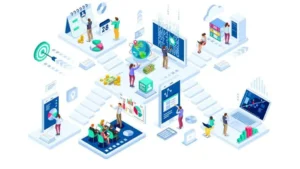Understanding Platform in the Digital Era..
In today’s rapidly evolving digital world, platforms play a crucial role in shaping how we interact, work, and innovate. From social media to business solutions, platforms have become the backbone of modern technology and connectivity. They serve as the bridge between users and services, offering a foundation for endless possibilities.

What Are Platforms and Why Are They Important?
Platforms are systems or frameworks that enable multiple parties to interact, collaborate, or exchange value. Think of them as virtual ecosystems where users, businesses, and developers come together.
Key Examples of Platform,
- Social Platform, Facebook, Twitter, and Instagram.
- E-commerce Platform, Amazon, eBay, and Shopify.
- Technology Platform, Microsoft Azure, Google Cloud, and AWS.
Their significance lies in their ability to centralize services, simplify processes, and enhance user experiences, making them essential in our interconnected world.
Types of Platform You Encounter Daily
1. Social Media Platform
Social platform are designed to connect people, share ideas, and build communities. From personal interactions to business networking, these shape our social and professional lives.
2. Business Platform
Business platform focuses on helping companies streamline operations, manage customer relationships, and grow efficiently. Examples include CRM tools like HubSpot and Salesforce.
3. E-commerce Platform
E-commerce platform bring buyers and sellers together. With secure payment gateways, personalized recommendations, and seamless shopping experiences, they dominate the retail landscape.
Why Are Platforms So Popular?
The popularity of platform stems from their ability to adapt and cater to various needs. Here are some reasons why they are thriving:
- Accessibility: Platform provides easy access to services from anywhere in the world.
- Scalability: They grow with user demand, making them sustainable in the long run.
- Innovation: Platform drives innovation by encouraging collaboration and creativity.
The Benefits of Platform
- Convenience
Platform makes tasks like shopping, communicating, and managing projects effortless and efficient. - Global Reach
Whether you’re running a business or connecting with friends, platform helps you interact globally without barriers. - Cost-Efficiency
For businesses, platform reduce operational costs by offering ready-made solutions.
Challenges Platforms Face
Despite their benefits, platform also encounter hurdles:
- Data Privacy: Ensuring user data is protected is a major challenge.
- Market Competition: With so many platforms available, standing out requires constant innovation.
- User Trust: they must maintain transparency to build and retain trust.
The Future of Platforms
As technology advances, platforms will continue to evolve, offering new features and capabilities. Here are some trends to watch:
- AI Integration
Artificial intelligence will make them smarter, enabling personalized experiences and predictive insights. - Decentralization
Blockchain technology is paving the way for decentralized platforms that prioritize user control and security. - Sustainability
Future platforms will focus on eco-friendly practices, reducing their environmental impact.
FAQs
Q1: What is the main purpose of a platform?
A platform aims to connect users, streamline processes, and provide value through interaction and collaboration.
Q2: How do they generate revenue?
Platforms often use subscription models, advertising, and transaction fees to generate income.
Q3: Are these the same as websites?
Not exactly. While websites are static online pages, platforms offer interactive ecosystems for users to engage in various activities.
Conclusion
these are transforming industries and redefining how we live, work, and interact. From simplifying daily tasks to fostering innovation, their impact is undeniable. As we look to the future, platforms will remain at the forefront of digital progress, connecting people and ideas like never before.







